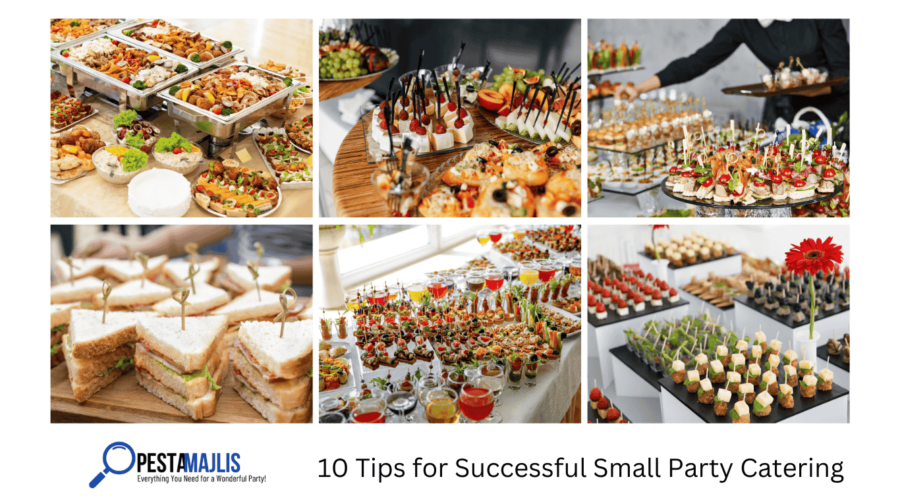10 Tips for Successful Small Party Catering
Table of Contents
Introduction
Planning a small party catering can often be just as challenging as hosting a large event. Whether it’s a birthday celebration, a family gathering, or a cozy get-together with friends, ensuring that the catering goes smoothly is essential. The right food and drink can transform a regular party into a memorable event. In this article, we’ll cover ten practical tips to help you successfully cater for small parties, ensuring all your guests leave satisfied and impressed.
1. Understand Your Guests’ Preferences
Know Your Audience
One of the biggest secrets to successful small party catering is understanding the culinary preferences of your guests. Take time to ask about:
Dietary restrictions (vegetarian, vegan, gluten-free, etc.)
Food allergies (nuts, dairy, shellfish, etc.)
Favorite cuisines (Malay, Chinese, Indian, etc.)
Reaching out to your guests ahead of time ensures everyone has something they can enjoy.
2. Plan a Balanced Menu
Variety Is Key
Ensure your menu offers a good balance of different types of foods, including:
Appetizers: Finger foods, dips, and small bites.
Main Courses: A mix of proteins and vegetables.
Desserts: Light treats that complement the main course.
Variety not only caters to different tastes but also adds an element of excitement to the meal.
3. Consider the Venue
Space and Facilities
The location of the party can greatly impact your catering decisions. Consider:
Kitchen Facilities: Does the venue have a kitchen you can use?
Serving Space: Is there enough room to set up a buffet or to serve plated meals?
Seating Arrangements: Will guests be sitting or standing?
Adapting your menu and setup to fit the venue will make the service smoother.
4. Prep Ahead of Time
Time Management
Preparation is crucial for small party catering. Plan what can be done ahead of time:
Prep Ingredients: Chop vegetables, marinate meats, and prepare sauces days in advance.
Cook in Advance: Prepare dishes that can be made ahead and reheated.
Arrange Serving Platters: Set up your serving dishes and utensils the day before.
Prep work reduces last-minute stress and ensures you’re ready on the day of the event.
5. Hire Help for Small Party Catering if needed
Extra Hands
Even for small parties, having extra hands can make a big difference. Consider hiring:
A Chef or Cook: To handle the main dishes.
Servers: For passing out appetizers and drinks.
A Cleaner: To keep the area tidy during and after the event.
Extra help allows you to enjoy the event along with your guests.
6. Presentation Matters
Visual Appeal
The presentation of your food can elevate the entire dining experience. Pay attention to:
Plating: Invest time in how the food is served.
Decorations: Use garnishes and themed decor to enhance the dining area.
Serving Ware: Use elegant or matching serving dishes.
First impressions matter, and a beautiful presentation can set the tone for the party.
7. Drink Choices
Beverage Selection
Offer a variety of drink options to cater to all tastes:
Alcoholic: A selection of wines, beers, and a few signature cocktails.
Non-Alcoholic: Juices, soft drinks, sparkling water, and mocktails.
Hot Drinks: Tea and coffee for after the meal.
Having a variety ensures everyone finds something they like and can refresh themselves easily.
8. Efficient Serving Techniques
Ease of Access
Ensure that your food is easy to serve and eat. Consider:
Buffet Style: Guests can serve themselves, reducing the need for multiple servers.
Bite-Sized Portions: Easier for guests to handle, especially if they are mingling.
Labels: Clearly mark dishes, especially for dietary restrictions.
An efficient serving setup keeps the flow of the party smooth.
9. Monitor Portions
Avoid Wastage
Monitor portions to avoid running out of food or having too much left over:
Estimate Portions: Plan based on the number of guests.
Batch Cooking: Prepare in batches so you can adjust as needed.
Backup Options: Keep simple, quick-to-prepare items as back-ups.
Proper portion control ensures everyone gets enough to eat without unnecessary waste.
10. Follow Up
Feedback and Improvement
After the event, follow up to gather feedback:
Ask Guests: What they enjoyed and what could be improved.
Reflect: On what went well and what was challenging.
This feedback will be invaluable for future catering gigs, helping you refine your skills.
Conclusion
Catering a small party successfully is about balancing preparation, variety, presentation, and understanding your guests’ needs. By following these ten tips, you’ll be well on your way to hosting a memorable and enjoyable event. So, next time you find yourself in charge of the catering, remember: a little planning goes a long way. Happy party planning! If you decided not to cater yourself, you may need to read our guide to choose the caterer here.
“The best parties are not only about the food and drink but also about how well they are served and enjoyed by everyone involved.”
For more tips and tricks on party planning, check out our other articles.
Feel free to share your party experiences and any additional tips in the comments below! Don’t forget to follow our Facebook for more updates.

